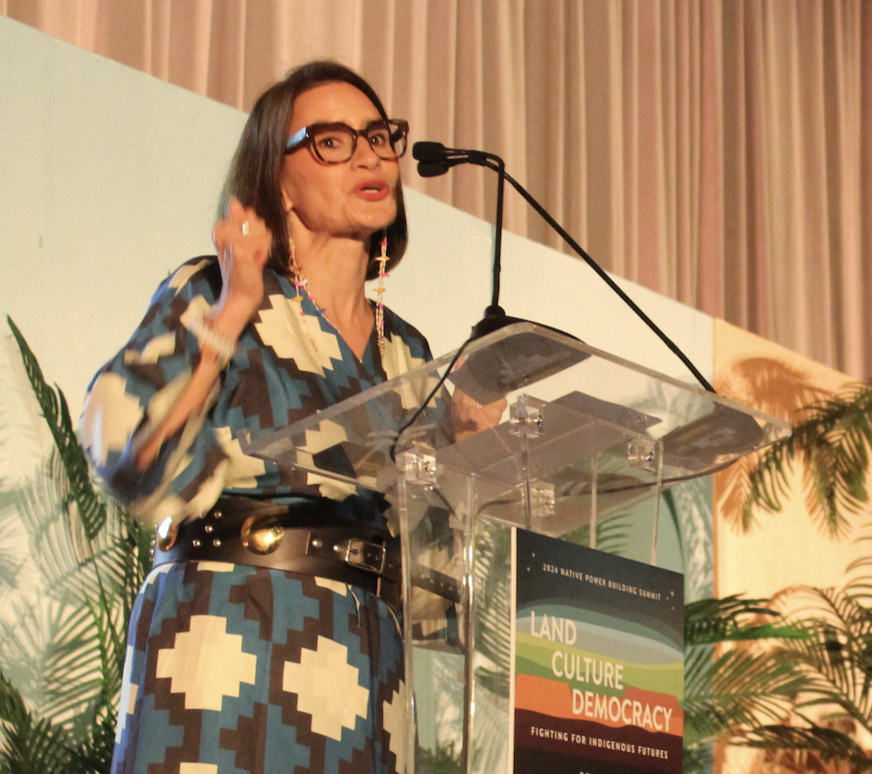
- Details
- By Neely Bardwell
Native Vote. Current Minnesota Lt. Governor Peggy Flanagan announced today that she will not be taking corporate donations in her bid for the U.S. Senate.
Starting her run for Senate early, Flanagan has made it clear that she will be rejecting money from powerful corporate political action committees in order to stand strong for the people of Minnesota.
“Taking corporate money is a choice, and it’s an easy choice for me: I’m not taking money from corporations, and I never will,” said Lt. Governor Flanagan. “I’m running a grassroots campaign powered by people, not corporate checks. I can’t stand strong for Minnesotans in Washington if I’m beholden to the billionaires that rigged our government in the first place.”
Before Flanagan was Lt. Governor, she served on the Minneapolis School Board, was the Executive Director of the Children’s Defense Fund-Minnesota, and also served in the State House. Her dedication to working on behalf of Minnesota’s families, children, and small businesses is made clear through her work.
Now, she is running for the U.S. Senate to fight back against the cutting of crucial programs like Medicare and Social Security; being the voice of Minnesota families in Washington. Since launching her campaign, Flanagan has hosted 12 Kitchen Table Conversations around the state, the majority in red districts in greater Minnesota, to listen to what Minnesotans have to say.
So far, Flanagan has visited St. Louis Park, Apple Valley, Duluth, Hibbing, Rochester, St. Cloud, Wood Lake, Moorhead, Bemidji, Brainerd, Blaine, and Minnetonka. Next stop for her is St. Paul for Kitchen Table Conversation number 13.
More Stories Like This
Native News Weekly (August 25, 2024): D.C. BriefsUS Presidents in Their Own Words Concerning American Indians
Indigenous Actor Elaine Miles Reports Detention by Alleged ICE Agents
Happy Thanksgiving from Native News Online
Coming Up on Native Bidaské: Behind the Animation: Joey Clift Talks “Pow” and Native Storytelling
Help us tell the stories that could save Native languages and food traditions
At a critical moment for Indian Country, Native News Online is embarking on our most ambitious reporting project yet: "Cultivating Culture," a three-year investigation into two forces shaping Native community survival—food sovereignty and language revitalization.
The devastating impact of COVID-19 accelerated the loss of Native elders and with them, irreplaceable cultural knowledge. Yet across tribal communities, innovative leaders are fighting back, reclaiming traditional food systems and breathing new life into Native languages. These aren't just cultural preservation efforts—they're powerful pathways to community health, healing, and resilience.
Our dedicated reporting team will spend three years documenting these stories through on-the-ground reporting in 18 tribal communities, producing over 200 in-depth stories, 18 podcast episodes, and multimedia content that amplifies Indigenous voices. We'll show policymakers, funders, and allies how cultural restoration directly impacts physical and mental wellness while celebrating successful models of sovereignty and self-determination.
This isn't corporate media parachuting into Indian Country for a quick story. This is sustained, relationship-based journalism by Native reporters who understand these communities. It's "Warrior Journalism"—fearless reporting that serves the 5.5 million readers who depend on us for news that mainstream media often ignores.
We need your help right now. While we've secured partial funding, we're still $450,000 short of our three-year budget. Our immediate goal is $25,000 this month to keep this critical work moving forward—funding reporter salaries, travel to remote communities, photography, and the deep reporting these stories deserve.
Every dollar directly supports Indigenous journalists telling Indigenous stories. Whether it's $5 or $50, your contribution ensures these vital narratives of resilience, innovation, and hope don't disappear into silence.
 The stakes couldn't be higher. Native languages are being lost at an alarming rate. Food insecurity plagues many tribal communities. But solutions are emerging, and these stories need to be told.
The stakes couldn't be higher. Native languages are being lost at an alarming rate. Food insecurity plagues many tribal communities. But solutions are emerging, and these stories need to be told.
Support independent Native journalism. Fund the stories that matter.
Levi Rickert (Potawatomi), Editor & Publisher

